Ways To Un-stick A Stuck Story
Ways to un-stick a stuck story
Do an outline, whatever way works best. Get yourself out of the word soup and know where the story is headed.
Conflicts and obstacles. Hurt the protagonist, put things in their way, this keeps the story interesting. An easy journey makes the story boring and boring is hard to write.
Change the POV. Sometimes all it takes to untangle a knotted story is to look at it through different eyes, be it through the sidekick, the antagonist, a minor character, whatever.
Know the characters. You can’t write a story if the characters are strangers to you. Know their likes, dislikes, fears, and most importantly, their motivation. This makes the path clearer.
Fill in holes. Writing doesn’t have to be linear; you can always go back and fill in plotholes, and add content and context.
Have flashbacks, hallucinations, dream sequences or foreshadowing events. These stir the story up, deviations from the expected course add a feeling of urgency and uncertainty to the narrative.
Introduce a new mystery. If there’s something that just doesn’t add up, a big question mark, the story becomes more compelling. Beware: this can also cause you to sink further into the mire.
Take something from your protagonist. A weapon, asset, ally or loved one. Force him to operate without it, it can reinvigorate a stale story.
Twists and betrayal. Maybe someone isn’t who they say they are or the protagonist is betrayed by someone he thought he could trust. This can shake the story up and get it rolling again.
Secrets. If someone has a deep, dark secret that they’re forced to lie about, it’s a good way to stir up some fresh conflict. New lies to cover up the old ones, the secret being revealed, and all the resulting chaos.
Kill someone. Make a character death that is productive to the plot, but not “just because”. If done well, it affects all the characters, stirs up the story and gets it moving.
Ill-advised character actions. Tension is created when a character we love does something we hate. Identify the thing the readers don’t want to happen, then engineer it so it happens worse than they imagined.
Create cliff-hangers. Keep the readers’ attention by putting the characters into new problems and make them wait for you to write your way out of it. This challenge can really bring out your creativity.
Raise the stakes. Make the consequences of failure worse, make the journey harder. Suddenly the protagonist’s goal is more than he expected, or he has to make an important choice.
Make the hero active. You can’t always wait for external influences on the characters, sometimes you have to make the hero take actions himself. Not necessarily to be successful, but active and complicit in the narrative.
Different threat levels. Make the conflicts on a physical level (“I’m about to be killed by a demon”), an emotional level (“But that demon was my true love”) and a philosophical level (“If I’m forced to kill my true love before they kill me, how can love ever succeed in the face of evil?”).
Figure out an ending. If you know where the story is going to end, it helps get the ball rolling towards that end, even if it’s not the same ending that you actually end up writing.
What if? What if the hero kills the antagonist now, gets captured, or goes insane? When your write down different questions like these, the answer to how to continue the story will present itself.
Start fresh or skip ahead. Delete the last five thousand words and try again. It’s terrifying at first, but frees you up for a fresh start to find a proper path. Or you can skip the part that’s putting you on edge – forget about that fidgety crap, you can do it later – and write the next scene. Whatever was in-between will come with time.
More Posts from Sorayali20 and Others

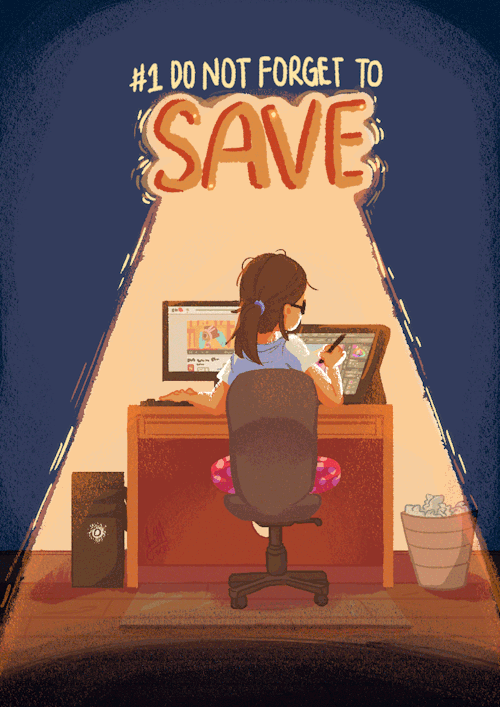
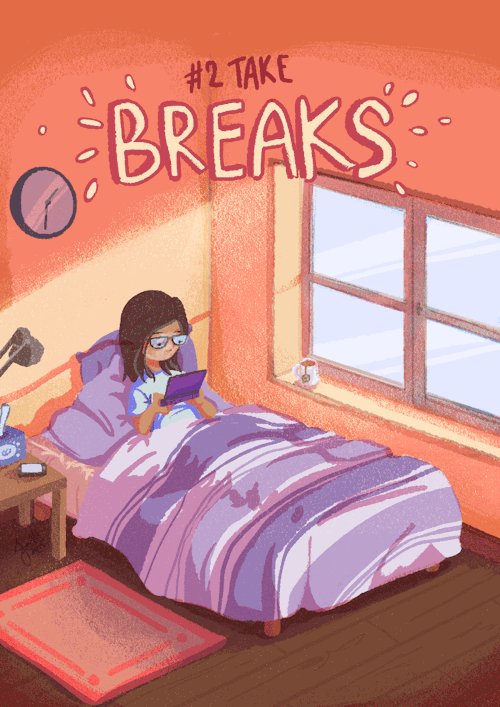

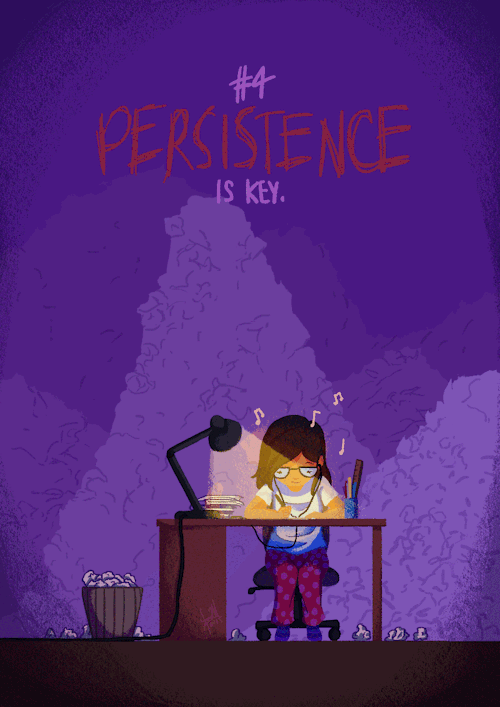

some things I need to remind myself daily tbh
Chapters: 3/? Fandom: Stargate Atlantis Rating: Teen And Up Audiences Warnings: No Archive Warnings Apply Relationships: John Sheppard/Elizabeth Weir Characters: John Sheppard, Elizabeth Weir Additional Tags: Fluff and Humor, Video & Computer Games, Dialogue Heavy Summary:
Dr. Elizabeth Weir is a secret gamer grrl, and Col. John Sheppard is surprised at her skills!
Female Characters to Avoid in your Writing: An Illustrated Guide.
1. The Bella Swan (i.e. the blank sheet of paper)

Who she is:
In Twilight, Bella has absolutely no qualities that make her interesting as a character. She’s shown to have very little personality, in the books or onscreen, and is only made “interesting” (a relative term here) via the inclusion of her sparkly, abusive boyfriend. It feeds into the harmful mentality of adolescent girls that you need a significant other in order to find fulfillment, particularly if he’s significantly older and likes to watch you sleep. Yikes.
Examples:
Bella is welcomed to school by a friendly, extroverted girl and given a place to sit amongst her and her friends. Despite this girl’s kindness, Bella shrugs her off as a stereotypical shallow cheerleader, and spends her time staring wistfully at the guy across the cafeteria from them. Once Edward becomes her official boyfriend, she immediately loses interest in her new friends as her life shifts its orbit to revolve completely around him.
How to avoid her:
Female characters are allowed to have lives outside of their significant others. They’re allowed to have friends, quirks, hobbies, and interests. Give them some.
The best fictional relationships are based off of characters who compliment each other, not one character who revolves around the other. Make sure your female character’s life does not centralize around her significant other.
Strong female characters don’t look down on other girls, even if they are outgoing cheerleaders. Being pasty and introverted doesn’t make you a better person, y’all – if it did, I’d be a decorated hero by now.
Give them aspirations besides getting an obsessive, much-older boyfriend. In fact, don’t give them an obsessive, much-older boyfriend at all – if you do want them to have a significant other, give them one who cares about their interests and accepts that they have lives and goals outside of them.
2. The Molly Hooper (i.e. the starry-eyed punching bag)

Who she is:
Like most things about BBC’s Sherlock, Molly was an amazing concept that went progressively downhill. I used to love her quiet tenacity and emotional intelligence, and was sure that with her strong basis as a character, she would overcome her infatuation with the titular Sherlock and find self-fulfillment. Nope!
Examples:
She remained stubbornly infatuated over the course of five years with an ambiguously gay man who, en large, treated her badly, leading to her public humiliation with zero pertinence to the plot or resolution. Moreover, her infatuation with Sherlock quickly usurped almost all of her other characteristics, leading her to an increasingly immature characterization that was difficult to relate to.
How to avoid her:
By all means, please write female characters who are quiet, kind, and unassuming (a female character does not, contrary to popular belief, need to be rambunctious, callous, or violent to be “strong”) but remember than none of these traits need to make the character a pushover. Let them stand their ground.
Similarly, attraction to men (or anyone, for that matter) does not invalidate a female character’s strength. Just be sure she values herself more than their attention.
As I said earlier, don’t be afraid to make characters who are gentle and soft-spoken, but be wary of making them “childlike,” or giving them an infantile, emotionally characterization.
My best advice for writing gentle, soft-spoken, unassuming women would actually to look to male characters in the media fitting this description; since male characters are rarely infantilized as much as women are by popular media, you’ll get a much better idea of what a well-rounded character looks like.
3. The Irene Adler (i.e. the defanged badass)

Who she is:
Yup, another one of the BBC Sherlock women, among whom only Mrs. Hudson seemed to come through with her dignity and characterization intact. In the books, Irene and Sherlock have absolutely zero romantic connotations, only bonded via Sherlock’s irritation and respect with her substantial intelligence. In the show, it’s a different story entirely.
Examples:
Irene is a badass character who’s turned into a teary-eyed Damsel in Distress via her uncontrollable love for the show’s male lead. It doesn’t help matters that she’s a self-proclaimed lesbian who falls in love with a man, which, unless you’re a woman who loves women yourself and writing about a character realizing she’s bi/pansexual, I would recommend against doing under any circumstances. She ends up being defeated and subsequently rescued by Sherlock – a far cry from her defeat of him in the books.
How to avoid her:
If you’re writing a badass female character, allow her to actually be badass, and allow her to actually show it throughout your work as opposed to just hearing other characters say it. And one punch or kick isn’t enough, either: I want to see this chick jump out of planes.
That said, “badass” does not equal emotionally callous. It doesn’t bother me that Moffat showed Irene having feelings for someone else, what bothers me is how he went about it.
When writing a character who’s shown to be attracted to more than one gender, just say she’s bisexual. Pansexual. Whatever, just don’t call her straight/gay depending on the situation she’s in. Jesus.
4. The Becky (i.e. the comedic rapist)

Who she is:
Most people who know me can vouch for my adoration of Supernatural, but it definitely has its problems: it’s not as diverse as it could be, its treatment of women is subpar, and yes, there is some thinly veiled sexual violence: all three of its leading characters have dealt with it at one point of another (Dean is routinely groped by female demons, a virginal Castiel was sexually taken advantage of by a disguised reaper, and the whole concept of sex under demonic possession is iffy to say the least.) It’s rarely ever addressed afterwards, and is commonly used for comedic fodder. Possibly the most quintessential example of this is Becky.
Examples:
Becky abducts Sam, ties him to the bed, and kisses him against his will. She then drugs him, albeit with a love potion, and is implied to have had sex with him under its influence.
How to avoid her:
Male rape isn’t funny, y’all. Media still takes rape against women a lot more seriously than rape against men, particularly female-on-male rape, and I can assure you its not.
Educate yourself on statistics for male sexual assault: approximately thirty-eight percent of sexual violence survivors are male, for example, and approximately one in sixteen male college students has reported to have experienced sexual assault.
Moreover, be aware that forty-six percent of all instances of male rape have a female perpetrator.
Read more here in this amazing article: http://www.slate.com/articles/double_x/doublex/2014/04/male_rape_in_america_a_new_study_reveals_that_men_are_sexually_assaulted.html
In other words, treat themes of sexual assault against men as seriously as you would treat themes of sexual assault against women.
5. The Movie Hermione (i.e. the flawless superhuman)

Who she is:
Okay, in and of herself, Movie Hermione is amazing: she’s beautiful, intelligent, and heroic, as well as possibly the most useful character of the franchise. She only bothers me in context of the fact that she takes away everything I loved most about Book Hermoine, and everything I loved about Book Ron, too.
Examples:
Book Hermione was beautiful, but not conventionally: she had big, poofy curls, big teeth, and didn’t put a lot of effort into maintaining her appearance. Movie Hermione looks effortlessly flawless, all the time. Book Hermione was intelligent, but also loud, abrasive, and unintentionally annoying when talking about her interests (which meant a lot to me, because as a kid on the Asperger’s spectrum, I frequently was/am that way myself – it was nice to see a character struggling with the same traits). She was also allowed to have flaws, such as struggling to keep up with academia, and being terrified of failure.
Movie Hermione also took all of Ron’s redeeming qualities, and everything that made him compliment her as a couple: his street smarts used to compliment her academic intelligence, for example, staying calm while she panicked in the Philosopher’s Stone when they were being overcome with vines. He also stood up for her in the books against Snape, as opposed to the jerkish “he’s right, you know.”
How to avoid her:
Allow your female characters to have flaws, as much so as any well-rounded male character. Just be sure to counterbalance them with a suitable amount of redeeming qualities. This will make your female character well-rounded, dynamic, and easy to get invested in.
There’s no reason for your female characters to always look perfect. Sure, they can be stunningly gorgeous (particularly if their appearance is important to them), but it’s physical imperfections that make characters fun to imagine: Harry’s scar and wild hair, for example. Female characters are no different.
If you’re writing a female character to have an eventual love interest, allow their personalities to compliment one another. Allow the love interest to have qualities that the female character is lacking, so that they can compliment one another and have better chemistry.
Basically, write your female characters as people.
Check out my list of male characters to avoid here: https://thecaffeinebookwarrior.tumblr.com/post/161184030785/male-protagonists-to-avoid-in-your-writing-an.
God willing, I will be publishing essays like this approximately every Friday, so be sure to follow my blog and stay tuned for future writing advice and observations!
No matter how many times you fail to meet your own expectations, you have to forgive yourself. Despite contrary belief, dwelling on and badgering yourself over your faults doesn’t ever help you grow into who you want to be.
It’s like gardening: if your flower isn’t blossoming like you want it to, you don’t rip out its leaves as punishment for failing to satisfy you. You recognize the problem and figure out what’s going wrong with its environment so you can modify it, giving the flower a chance to bloom in its own time.
Accept your shortcoming or setback, forgive yourself, and figure out what’s going wrong so that you can plan for how to prevent it from repeating in the future. Thank your past self for trying in the first place and then give your future self the love needed to flourish.
Writing Resources Masterlist
Masterlist of…
Facial Expressions
50 Romance Plot Ideas
Gestures and Body Language
Physical Descriptions
Voice Descriptions
Writing Sex/Body
500 Great Words for Writing Love Scenes
Synonyms for Parts of the Body
7 Rules for Writing Sex Scenes
How to Write a Sex Scene
Action
How to Write a Fight Scene
How to Write a Fight Scene (in 11 Steps)
8 Things Writers Forget When Writing Fight Scenes
Characters
How to Make Your Reader Care About Your Characters
The 5 Absolute Dimensions of Character Personality
5 Ways to Hide Your Villain In Plain Sight
33 WAYS TO WRITE STRONGER CHARACTERS
39 Villain Motivations
MAKING A DARK CHARACTER LIKEABLE THROUGH VULNERABILITIES
Dialogue
HOW TO WRITE ARGUMENTS WITH MAXIMUM PUNCH
19 Ways to Write Better Dialogue
50 Things Your Characters Can Do WHILE They Talk
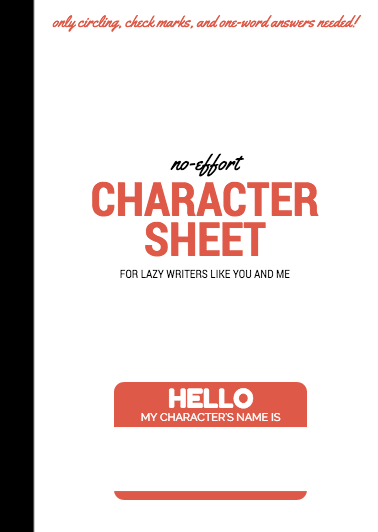
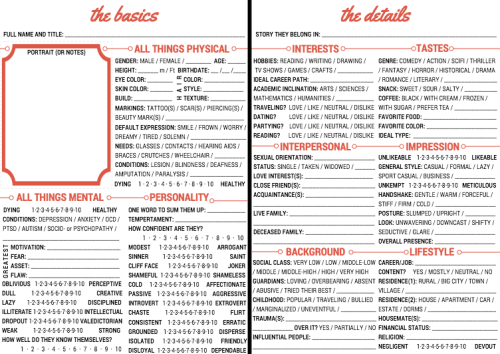
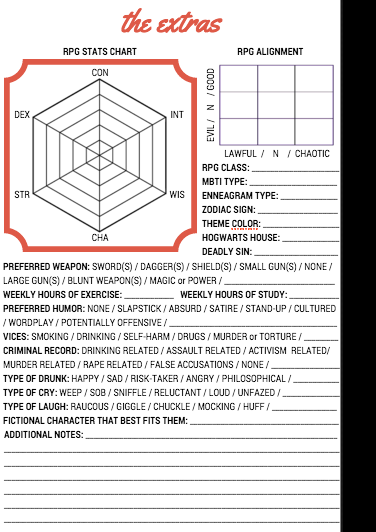
From the makers of the no-effort character checklist, I bring to you… The no-effort complete character sheet for lazy writers like you and me™!
Because the extra effort I put in staying up until 3 am to do put this together can save us all a lot of effort filling out longer character sheets ^^
You’re supposed to print it out and fold it in half to make a little booklet but you can save ink and do it on your computer :P
Link to PDF on google drive (fixed typo)

Word Counter - Not only does it count the number of words you’ve written, it tells you which words are used most often and how many times they appear.
Tip Of My Tongue - Have you ever had a word on the tip of your tongue, but you just can’t figure out what it is? This site searches words by letters, length, definition, and more to alleviate that.
Readability Score - This calculates a multitude of text statistics, including character, syllable, word, and sentence count, characters and syllables per word, words per sentence, and average grade level.
Writer’s Block (Desktop Application) - This free application for your computer will block out everything on your computer until you meet a certain word count or spend a certain amount of time writing.
Cliche Finder - It does what the name says.
Write Rhymes - It’ll find rhymes for words as you write.
Verbix - This site conjugates verbs, because English is a weird language.
Graviax - This grammar checker is much more comprehensive than Microsoft Word, again, because English is a weird language.
Sorry for how short this is! I wanted to only include things I genuinely find useful.
YES 100%. I love Peggy. I love the people working on this project. A privilege and an honor to bring her back to the fans. I’d shoot on the weekends. Blue serum. Whatever it takes.
Hayley Atwell on Agent Carter being saved by Netflix. (via fuckyeahatwell)
like, the most compelling ships for me always stem out of one thing: the characters have a profound, ongoing effect on each other’s senses of selves. when they are apart, the characters’ actions are still affected by each other. the way they approach the world changes because of the other.
which is this deeply Austenian view of ideal romantic relationships as mechanisms by which we come to know ourselves better and become better versions of ourselves. good romance, for me, is always tied in with a sense of self-actualization, and the way in which a beloved partner allows a person to know themselves better.
Chapters: 5/? Fandom: The Mallorca Files (TV 2019) Rating: Teen And Up Audiences Warnings: No Archive Warnings Apply Relationships: Miranda Blake/Max Winter Characters: Miranda Blake, Max Winter, Inés Villegas Additional Tags: Wintake, post-series 3, Canon Divergent, Feelings Realization, Series 3 Episode 4 "Water Water" Mention, Undercover as a Couple, threat of gun violence Summary:
It’s Valentine’s Day, and it’s the first one since Max broke up with Carmen six months ago. Miranda tries to cheer Max up. Also, they go undercover as a couple again.
-
 vann-haal liked this · 1 week ago
vann-haal liked this · 1 week ago -
 mistakeshavebeenmade reblogged this · 1 week ago
mistakeshavebeenmade reblogged this · 1 week ago -
 alpinechamomile reblogged this · 2 weeks ago
alpinechamomile reblogged this · 2 weeks ago -
 alpinechamomile liked this · 2 weeks ago
alpinechamomile liked this · 2 weeks ago -
 writingmermaidzz reblogged this · 2 weeks ago
writingmermaidzz reblogged this · 2 weeks ago -
 zombies-on-chains liked this · 2 weeks ago
zombies-on-chains liked this · 2 weeks ago -
 mxgicthot reblogged this · 2 weeks ago
mxgicthot reblogged this · 2 weeks ago -
 starlight-in-a-bottle reblogged this · 2 weeks ago
starlight-in-a-bottle reblogged this · 2 weeks ago -
 writingreblogg reblogged this · 2 weeks ago
writingreblogg reblogged this · 2 weeks ago -
 masterbutchbaiter liked this · 2 weeks ago
masterbutchbaiter liked this · 2 weeks ago -
 kmk1701d reblogged this · 2 weeks ago
kmk1701d reblogged this · 2 weeks ago -
 tales-of-whales reblogged this · 3 weeks ago
tales-of-whales reblogged this · 3 weeks ago -
 tales-of-whales liked this · 3 weeks ago
tales-of-whales liked this · 3 weeks ago -
 newdawnhorizon reblogged this · 3 weeks ago
newdawnhorizon reblogged this · 3 weeks ago -
 frammentidiscrittura reblogged this · 3 weeks ago
frammentidiscrittura reblogged this · 3 weeks ago -
 kurovera liked this · 3 weeks ago
kurovera liked this · 3 weeks ago -
 icewolfiewriting reblogged this · 4 weeks ago
icewolfiewriting reblogged this · 4 weeks ago -
 reynsh liked this · 4 weeks ago
reynsh liked this · 4 weeks ago -
 flamevbirdv reblogged this · 1 month ago
flamevbirdv reblogged this · 1 month ago -
 newdawnhorizon reblogged this · 1 month ago
newdawnhorizon reblogged this · 1 month ago -
 aurashire liked this · 1 month ago
aurashire liked this · 1 month ago -
 enntzim reblogged this · 1 month ago
enntzim reblogged this · 1 month ago -
 lammaspoika liked this · 1 month ago
lammaspoika liked this · 1 month ago -
 dpd-genrefictionbiblioholic liked this · 1 month ago
dpd-genrefictionbiblioholic liked this · 1 month ago -
 worldwatcher-d reblogged this · 1 month ago
worldwatcher-d reblogged this · 1 month ago -
 ladyofmisfortune liked this · 1 month ago
ladyofmisfortune liked this · 1 month ago -
 starlantern reblogged this · 2 months ago
starlantern reblogged this · 2 months ago -
 eiene liked this · 2 months ago
eiene liked this · 2 months ago -
 linde121 liked this · 2 months ago
linde121 liked this · 2 months ago -
 mongooseandmeerkat liked this · 2 months ago
mongooseandmeerkat liked this · 2 months ago -
 selfkaiharness liked this · 2 months ago
selfkaiharness liked this · 2 months ago -
 nonbitchnarie liked this · 2 months ago
nonbitchnarie liked this · 2 months ago -
 vintagebishx liked this · 2 months ago
vintagebishx liked this · 2 months ago -
 fizzwizzpop liked this · 2 months ago
fizzwizzpop liked this · 2 months ago -
 danzinora-switch liked this · 2 months ago
danzinora-switch liked this · 2 months ago -
 banana-vatore liked this · 2 months ago
banana-vatore liked this · 2 months ago -
 brushes-of-sage reblogged this · 2 months ago
brushes-of-sage reblogged this · 2 months ago -
 brushes-of-sage liked this · 2 months ago
brushes-of-sage liked this · 2 months ago -
 dorklord-maouvioletta liked this · 3 months ago
dorklord-maouvioletta liked this · 3 months ago -
 whitemistwalker liked this · 3 months ago
whitemistwalker liked this · 3 months ago -
 gia-d liked this · 3 months ago
gia-d liked this · 3 months ago -
 benthicghost reblogged this · 3 months ago
benthicghost reblogged this · 3 months ago -
 charlie-larsenhoff liked this · 3 months ago
charlie-larsenhoff liked this · 3 months ago -
 misseligon liked this · 3 months ago
misseligon liked this · 3 months ago -
 slowpokecurry liked this · 3 months ago
slowpokecurry liked this · 3 months ago -
 mister-e-muss reblogged this · 3 months ago
mister-e-muss reblogged this · 3 months ago -
 mister-e-muss liked this · 3 months ago
mister-e-muss liked this · 3 months ago
Aspiring author, Fan of Star Trek Voyager, Stargate SG-1, Stargate Atlantis, The 100, Marvel's Agent Carter, Sparky (John Sheppard/Elizabeth Weir), Kabby, Sam/Jack, and J/C are my OTP's
82 posts